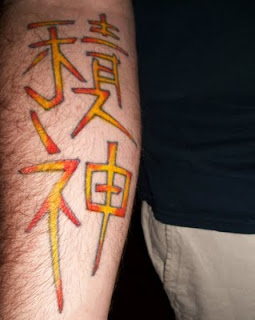to: tiangotlost@gmail.com
date: Thu, Apr 21, 2011 at 4:07 PM
subject: another stupid tattoo question
Dear Tian,
I just ran across your blog and love it!
Question: about ten years ago I took the character for "Courage" that I found in a Chinese Dictionary into a tattoo parlor. I really wanted the character for "courage" on my back, but the dictionary said that the character also stood for "gall bladder."
I wasn't sure that I actually wanted the character for "gall bladder" on my back, so when I saw a character that also supposedly meant "courage" on a sign full of symbols and pictures hanging on the tattoo parlor wall I said to myself, "tattoo parlors don't lie!" and asked for that one instead.
I was recently told by a Chinese friend that my tattoo actually says "Dog Passing."
(I've known for years that the second character says "passing," but only recently found out about the "dog" part. I was told that this particular symbol for dog is archaic, which is why many of the non-Asian students of Chinese and Japanese that I asked before didn't know it....)
I'm hoping you might verify.
Thank you!

It is not "dog passing" or 犬過.
大過 [たいか] serious error; gross mistake


































